“Getting to gender equality starts with realising how far we have to go” is the title of the 2017 McKinsey Women in the Workplace report, a comprehensive study of the state of women in the corporate world.
This year 222 companies employing more than 12 million people shared their pipeline data and completed a survey of HR practices. As it is one of the largest studies of its kind its therefore very concerning that it reports “progress continues to be too slow—and may even be stalling".
Women remain underrepresented at every level, despite earning more college degrees than men for 30 years and counting. There is a pressing need to do more, and most organisations realise this: company commitment to gender diversity is at an all-time high for the third year in a row.
One of the most powerful reasons for this is a simple one: we have blind spots when it comes to diversity, and we can’t solve problems that we don’t see or understand clearly.
Many employees think women are well represented in leadership when they see only a few. And because they’ve got comfortable with the status quo, they don’t feel any urgency for change.
Diversity leads to stronger business results, as numerous studies have shown. But we can’t unlock the full potential of our workplace until we see how far from equality we really are.
In Northern Ireland, September saw the launch of the Gender Diversity Charter Mark NI at the Women in Business chair's lunch in Belfast.
The charter recognises that organisations cannot reach their full potential unless they benefit from the rich variety of talents and abilities of all their employees. A balanced workforce is good for business – it is good for customers, for profitability and workplace culture.
Allstate and the other founder charter mark signatories, including the Northern Ireland Civil Service, Belfast City Council, Progressive Group, Deloitte, Alexander Mann Solutions, Gilbert Ash and Queen's University have all blazed the trail for companies across Northern Ireland, pledging their commitment to the charter, and adopting the charter methodology to affect positive change within their own organisations.
A key supporter and a Women in Business gender diversity champion John Healy, managing director of Allstate Northern Ireland, said: “Advancing gender diversity is everybody’s business, and at Allstate we have decided to ensure that both halves of the talent pool have optimum opportunity in the workplace.
Through our Women in Technology and Embrace LGBT Groups, we are already witnessing the benefits that an inclusive workplace can bring. Now businesses here have the opportunity to do the same with the help of the Gender Diversity Charter Mark."
Widespread adoption of the charter commitments will make a genuine difference to gender diversity on a cross-sectoral basis and will help make the most of Northern Ireland’s talented workforce in a global competitive economy.
If you are interested in pledging your company’s commitment to gender diversity, you can register at www.chartermarkni.org .
:: Roseann Kelly (roseann@ womeninbusinessni.com) is chief executive of Women in Business (www.womeninbusinessni.com), the largest and fastest growing business network for female entrepreneurs and senior women in management in Northern Ireland, with 2,500 members spread throughout all industry sectors. Follow Women in Business NI on Facebook at www.facebook.com/women-inbusinessni or on Twitter @wibni.








